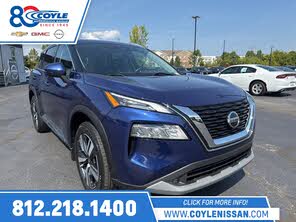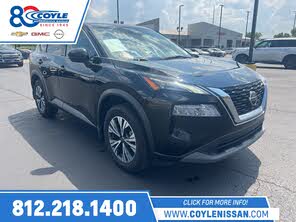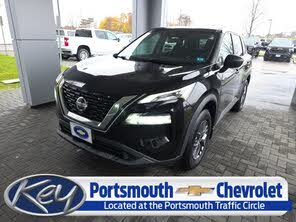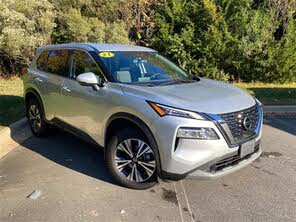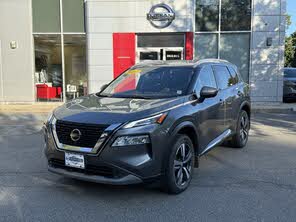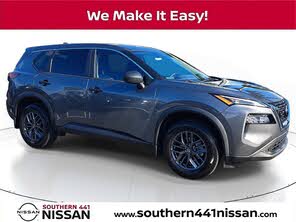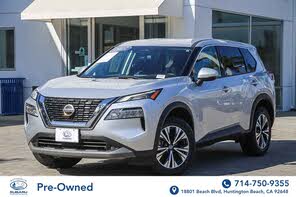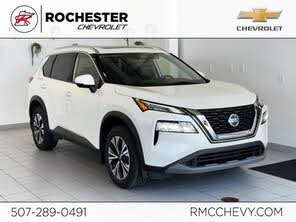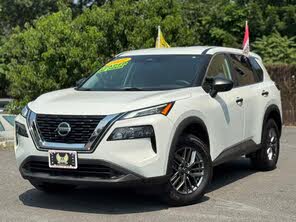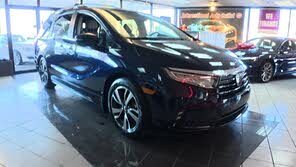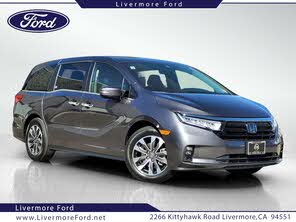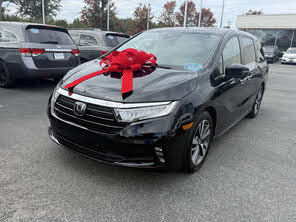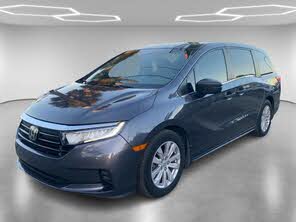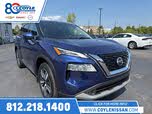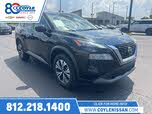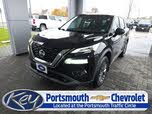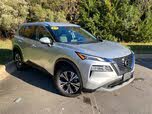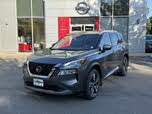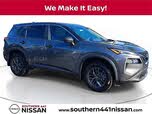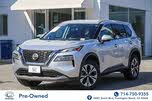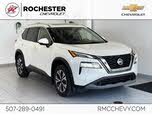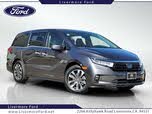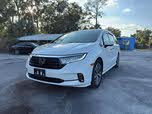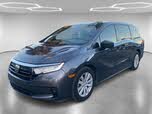2021 Nissan Rogue vs 2021 Honda Odyssey
Overview | |
MSRP$31,790 | MSRP$26,050 |
Listings254 | Listings2462 |
Ratings & Reviews | |
User Reviews | User Reviews |
Expert reviews7.8 out of 10 | Expert reviews9.0 out of 10 |
Pros
Cons
| Pros
Cons
|
2021 Honda Odyssey Reviews SummaryWhen you’re raising kids, the last thing your life needs is added complication. The modern minivan is designed to eliminate snags, simplify your existence, and reduce friction in the daily grind. Whether you wish to save money on gas, carry maximum cargo, or own a vehicle that is ridiculously easy to load (whether we’re talking passengers or merchandise), a minivan makes good sense. And the freshened 2021 Honda Odyssey is one of our favorites, for now. | |
2021 Nissan Rogue Reviews SummaryTo characterize the all-new 2021 Nissan Rogue as vital to the automaker's success is an understatement. Not only is the compact crossover SUV the best-selling Nissan in America, but it's also one of the best-selling vehicles in America. Strip out pickup trucks, and the Rogue sits near the top of the U.S. sales chart with its primary competitors, the Honda CR-V and Toyota RAV4. Imagine the pressure on Nissan designers, engineers, and product planners as they prepared the current Rogue's replacement! The good news is that the new Rogue is a better SUV in every way but one. | |
Popular Features & Specs | |
Engine3.5L 280 hp V6 | Engine2.5L 181 hp I4 |
Drive TrainFWD | Drive TrainFWD |
Seating Capacity7 | Seating Capacity5 |
Horsepower280 hp @ 6000 rpm | Horsepower181 hp @ 6000 rpm |
MPG City19 | MPG City27 |
MPG Highway28 | MPG Highway35 |
Engine | |
Engine Name3.5L 280 hp V6 | Engine Name2.5L 181 hp I4 |
Torque262 lb-ft @ 4700 rpm | Torque181 lb-ft @ 3600 rpm |
Horsepower280 hp @ 6000 rpm | Horsepower181 hp @ 6000 rpm |
DrivetrainFWD | DrivetrainFWD |
Fuel Economy | |
MPG City19 | MPG City27 |
MPG Highway28 | MPG Highway35 |
Interior | |
Seating Capacity7 | Seating Capacity5 |
Safety | |
Front Crash Overall5 | Front Crash Overall3 |
Side Crash Overall5 | Side Crash Overall5 |
Dimensions & Capacity | |
Cargo Space32.8 cu ft | Cargo Space31.6 cu ft |
Curb Weight4398 lbs | Curb Weight3371 lbs |
Height68.3 in | Height66.5 in |
Length205.2 in | Length183.0 in |
Width92.3 in | Width72.4 in |
Wheelbase118.1 in | Wheelbase106.5 in |
Maximum Payload1621 lbs | Maximum Payload1115 lbs |
Number of doors4 | Number of doors4 |
Maximum Towing Capacity3500 lbs | Maximum Towing Capacity |
Overview | ||
MSRP | $31,790 | $26,050 |
Listings | ||
Ratings & Reviews | ||
User reviews | ||
Expert reviews | 7.8 out of 10Read full review | 9.0 out of 10Read full review |
Pros & cons | Pros
Cons
| Pros
Cons
|
Summary | When you’re raising kids, the last thing your life needs is added complication. The modern minivan is designed to eliminate snags, simplify your existence, and reduce friction in the daily grind. Whether you wish to save money on gas, carry maximum cargo, or own a vehicle that is ridiculously easy to load (whether we’re talking passengers or merchandise), a minivan makes good sense. And the freshened 2021 Honda Odyssey is one of our favorites, for now. | To characterize the all-new 2021 Nissan Rogue as vital to the automaker's success is an understatement. Not only is the compact crossover SUV the best-selling Nissan in America, but it's also one of the best-selling vehicles in America. Strip out pickup trucks, and the Rogue sits near the top of the U.S. sales chart with its primary competitors, the Honda CR-V and Toyota RAV4. Imagine the pressure on Nissan designers, engineers, and product planners as they prepared the current Rogue's replacement! The good news is that the new Rogue is a better SUV in every way but one. |
Video | ||
Popular Features & Specs | ||
Engine | 3.5L 280 hp V6 | 2.5L 181 hp I4 |
Drive Train | FWD | FWD |
Seating Capacity | 7 | 5 |
Horsepower | 280 hp @ 6000 rpm | 181 hp @ 6000 rpm |
MPG City | 19 | 27 |
MPG Highway | 28 | 35 |
Engine | ||
Engine Name | 3.5L 280 hp V6 | 2.5L 181 hp I4 |
Torque | 262 lb-ft @ 4700 rpm | 181 lb-ft @ 3600 rpm |
Horsepower | 280 hp @ 6000 rpm | 181 hp @ 6000 rpm |
Drivetrain | FWD | FWD |
Fuel Economy | ||
MPG City | 19 | 27 |
MPG Highway | 28 | 35 |
Interior | ||
Seating Capacity | 7 | 5 |
Safety | ||
Front Crash Overall | 5 | 3 |
Side Crash Overall | 5 | 5 |
Dimensions & Capacity | ||
Cargo Space | 32.8 cu ft | 31.6 cu ft |
Curb Weight | 4398 lbs | 3371 lbs |
Height | 68.3 in | 66.5 in |
Length | 205.2 in | 183.0 in |
Width | 92.3 in | 72.4 in |
Wheelbase | 118.1 in | 106.5 in |
Maximum Payload | 1621 lbs | 1115 lbs |
Number of doors | 4 | 4 |
Maximum Towing Capacity | 3500 lbs | |
For the 2021 Honda Odyssey, the familiar styling had seen some updates, with a new grille and front bumper, along with standard LED headlights featuring automatic high-beam operation across all trim levels. The taillights were accentuated by a new gloss black spear with a chrome insert, modernizing the rear look. The top three trim levels had new wheel designs to keep things fresh. These subtle changes aimed to modernize the Odyssey's appearance by reducing brightwork.
The Odyssey's five trims—LX, EX, EX-L, Touring, and Elite—offered a range of base prices from $31,790 to $47,820, excluding destination charges. Color options like Deep Scarlet Pearl or Platinum White Pearl came with a $395 add-on fee. The test vehicle, a Lunar Silver Metallic in Elite trim, cost $48,940, including a $1,120 destination fee. The 2021 Odyssey Elite featured perforated leather upholstery with contrast stitching and new dashboard ambient lighting, elevating its upscale feel. Most Odyssey models saw seating material improvements, and new tri-color floor mats were designed to better conceal dirt.
The 2021 Odyssey Elite’s 19-inch wheels with Shark Gray paint, reduced chrome, and refined interior brought it closer to resembling a luxury minivan, much like an Acura in its category.
The 2021 Nissan Rogue displayed a handsome new styling, adopting a more technical appearance akin to an SUV. Dark gray plastic cladding around its perimeter, bold simulated skid plates, and lower door protection lent it an audacious, rugged look, especially noticeable on the back bumper. Clean LED lighting, a prominent V-Motion grille, and well-proportioned design provided the Rogue with a modern aesthetic. All trims featured aluminum wheels, with sizes up to 19 inches, and an optional two-tone paint with a black roof added a custom look.
Available in four trims—S ($25,650), SV ($27,340), SL ($32,000), and the new Platinum ($35,430)—the Rogue offered a range of features, with destination charges adding $1,095. Options included AWD for $1,400 and Premium Packages for SV and SL trims. The test model, a Rogue SL with added Premium Package and extra-cost paint, floor mats, and cargo protection, totaled $35,195 including destination charges.
The tested Rogue SL had an Almond color leather interior, a standard panoramic glass sunroof, and an ambiance-enhancing bright interior. Soft-touch surfaces, simulated wood trim, and fabric-wrapped windshield pillars contributed to the cabin’s sense of quality, with logical control arrangements. The top-tier Platinum trim offered quilted semi-aniline leather, contrast stitching, and ambient lighting for a truly luxurious interior. However, the climate control numbers had a retro look, and it still featured a CD player alongside modern wireless Apple CarPlay.


















The 2021 Honda Odyssey retained its 3.5-liter V6 engine paired with a ten-speed automatic transmission, offering 280 horsepower. This engine-transmission combo delivered smooth and effortless power. It featured variable cylinder management, enhancing fuel efficiency by operating on fewer cylinders when possible. The EPA rated it at 22 mpg in combined driving, and during testing, it averaged 21.8 mpg. Lacking AWD, the Odyssey fell behind competitors like Chrysler and Toyota in regions with frequent snow and ice.
For 2021, Honda introduced an electronic brake booster, supporting new stop-and-go capabilities for adaptive cruise control and claiming improved brake pedal feel and response. The Odyssey’s ride and handling were balanced, providing a pleasurable driving experience with well-weighted steering and firm, yet comfortable, ride quality. Touring and Elite trims featured 19-inch wheels that bolstered handling but suffered during intense braking tests, heating up quickly and showing signs of brake fade in strenuous conditions.
The 2021 Nissan Rogue, with its 2.5-liter four-cylinder engine producing 181 horsepower and 181 pound-feet of torque, felt underpowered for its nearly 3,500-pound weight. The continuously variable transmission (CVT) performed adequately, with programmed ratios mimicking a traditional automatic. Despite being fine for daily driving, the engine lacked vigor, especially in mountainous terrain. The SUV’s AWD, 8.2 inches of ground clearance, and new Snow and Off-Road modes made it more adventure-ready, although it struggled in high-altitude conditions.
During a media drive, Nissan hinted at future engine upgrades, possibly using the Altima sedan's turbocharged 2.0-liter four-cylinder. The available Sport, Standard, and Eco driving modes provided varying levels of responsiveness and efficiency. The tested Rogue SL with FWD returned 27.5 mpg, slightly below the EPA estimate of 29 mpg.
The Rogue’s ride and handling were significantly improved, thanks to a new robust architecture with 35% high-strength steel, strut front, multi-link rear suspension, and advanced control systems like Intelligent Trace Control and Active Ride Control. The new Vehicle Motion Control anticipated driving behaviors, enhancing overall enjoyment. The responsive and smooth handling was complemented by dramatically improved steering feel, owing to the electric assist being relocated from the steering column to the steering rack.
Inside the Honda Odyssey, drivers found clear instrumentation, logical controls, and plenty of storage. However, the lack of a tuning knob for the stereo was perplexing, and the transmission's button layout sometimes caused confusion. The Elite trim's 12-way power-adjustable driver's seat, heated steering wheel, and heated and ventilated front seats were standard, though it lacked a height adjuster for the front passenger seat, which, while not an issue for most, was noted.
Storage in the Odyssey was exceptional, with numerous compartments and shelves throughout. Odyssey models, except the base LX, featured the versatile Magic Slide second-row seat layout, offering multiple seating configurations to improve accessibility and space. The third row provided ample room for both adults and children. Cargo space behind the third row measured 32.8 cubic feet, expanding to 88.8 cubic feet with the third row folded and maxing out at 144.9 cubic feet, provided the second-row seats were physically removed, which remained cumbersome.
The Nissan Rogue's Zero Gravity seats aimed to replicate a neutral spine position for comfort. The improved seats came in cloth with the S trim and moved to premium leather in the Platinum trim. Added comforts like Quick Comfort heated seats and temperature-controlled triple-zone climate control were found in higher trims. The Rogue also boasted generous rear-seat headroom and legroom, nearly 90-degree opening rear doors, and ample LATCH anchors for child seats.
The Rogue was quieter due to aerodynamic tweaks and noise-reducing materials. Storage solutions were practical, including under-console storage, large door pockets, and a split-opening center armrest. Cargo space varied, with the S and SV offering 31.6 cubic feet, while the SL and Platinum featured the Divide-N-Hide system, expanding it to 36.5 cubic feet, and maxing out at 74.1 cubic feet with the rear seats folded—generous within its class.
Starting with the EX trim, the Honda Odyssey came equipped with an 8-inch touchscreen infotainment system, Apple CarPlay, Android Auto, satellite radio, HD Radio, and HondaLink connectivity. Higher trims added features like a navigation system, Wi-Fi capability, a CabinWatch camera, and a CabinTalk PA system. The top-tier Elite included an 11-speaker premium sound system and wireless smartphone charging. Honda offered various HondaLink subscription plans, some free for the first year or three months.
The system had some drawbacks, notably the lack of a tuning knob and subpar voice-recognition technology compared to modern smartphones. The rear-seat entertainment system in Touring and Elite trims included a 10.2-inch screen, Blu-Ray player, and several streaming apps, though it wasn’t a touchscreen, which disappointed some younger users.
The Nissan Rogue’s infotainment started with an 8-inch touchscreen, Bluetooth, SiriusXM, Apple CarPlay, and Android Auto in the base S trim. Higher trims added Wi-Fi, Amazon Alexa, Google Assistant integration, and additional NissanConnect Services. The larger 9-inch touchscreen, door-to-door navigation, wireless Apple CarPlay, and Bose premium audio came with the SL Premium Package or Platinum trim. While the system generally worked well, the small knobs and buttons were less user-friendly.
The top-tier Platinum trim offered extras like wireless smartphone charging, a 12.3-inch digital instrument cluster, and a 10.8-inch head-up display, enhancing the tech-savvy appeal of the Rogue.
Honda improved the 2021 Odyssey’s safety by making the Honda Sensing suite standard, which included features like adaptive cruise control with low-speed follow, pedestrian braking, and road-sign recognition. Upgrading to EX trim added a blind-spot warning with rear cross-traffic alert. While these systems worked accurately, they weren’t always the smoothest. The Odyssey retained its top safety ratings from IIHS and NHTSA, with most scores at five stars and four stars for rollover resistance.
Nissan prioritized safety in the 2021 Rogue, making the Nissan Safety Shield 360 standard across all trims. This comprehensive ADAS suite included features such as automatic emergency braking and blind-spot warning with rear cross-traffic alert. Blind-spot warning, often missing in base models of competitors, was an excellent inclusion. The Rogue added ten airbags, a driver monitoring system, and rear-seat reminder. Platinum trim further added a center front airbag.
Adaptive cruise control with ProPilot Assist was standard from the SV trim, and the SL Premium Package and Platinum trims featured an upgraded ProPilot with Navi-link, using GPS data to adjust speed on curves and ramps. ProPilot Assist showed significant improvement in accuracy and smoothness over earlier versions.
CarGurus highlights
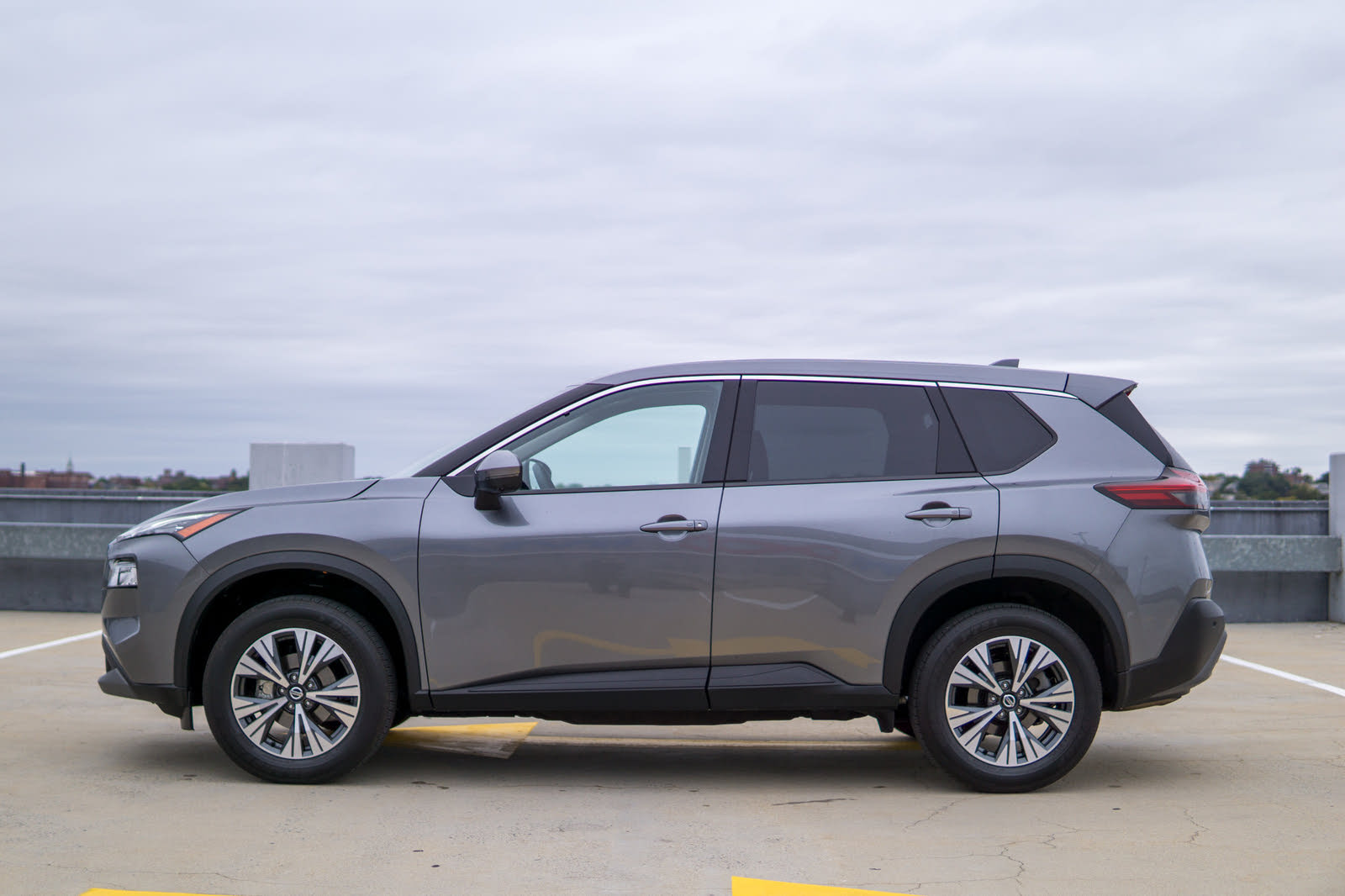
According to CarGurus experts, the overall rating for the 2021 Honda Odyssey was 7.8 out of 10, while the 2021 Nissan Rogue scored 9.0 out of 10. Based on these ratings, the clear recommendation goes to the 2021 Nissan Rogue, offering a superior blend of style, technology, safety, and performance.
Choose the 2021 Nissan Rogue if:
- You're looking for a more stylish, rugged SUV with better off-road capability.
- Advanced tech features like wireless Apple CarPlay, navigational enhancements, and ProPilot Assist matter.
- Safety systems, including blind-spot warning standard on all trims, are a priority.
Choose the 2021 Honda Odyssey if:
- You need maximum cargo capacity with flexible seating configurations.
- A more luxurious minivan experience is appealing.
- Advanced family-friendly technology like CabinWatch and Magic Slide seats are important to you.
CarGurus highlights

According to CarGurus experts, the overall rating for the 2021 Honda Odyssey was 7.8 out of 10, while the 2021 Nissan Rogue scored 9.0 out of 10. Based on these ratings, the clear recommendation goes to the 2021 Nissan Rogue, offering a superior blend of style, technology, safety, and performance.
Choose the 2021 Nissan Rogue if:
Shop Now- You're looking for a more stylish, rugged SUV with better off-road capability.
- Advanced tech features like wireless Apple CarPlay, navigational enhancements, and ProPilot Assist matter.
- Safety systems, including blind-spot warning standard on all trims, are a priority.
Choose the 2021 Honda Odyssey if:
Shop Now- You need maximum cargo capacity with flexible seating configurations.
- A more luxurious minivan experience is appealing.
- Advanced family-friendly technology like CabinWatch and Magic Slide seats are important to you.

By: CarGurus + AI
At CarGurus, our team of experienced automotive writers remain at the heart of our content operation, conducting hands-on car tests and writing insightful guides that are backed by years of industry experience. To complement this, we are harnessing AI to make our content offering more diverse and more helpful to shoppers than ever. To achieve this, our AI systems are based exclusively on CarGurus content, ratings and data, so that what we produce is both unique to CarGurus, and uniquely helpful to car shoppers.

